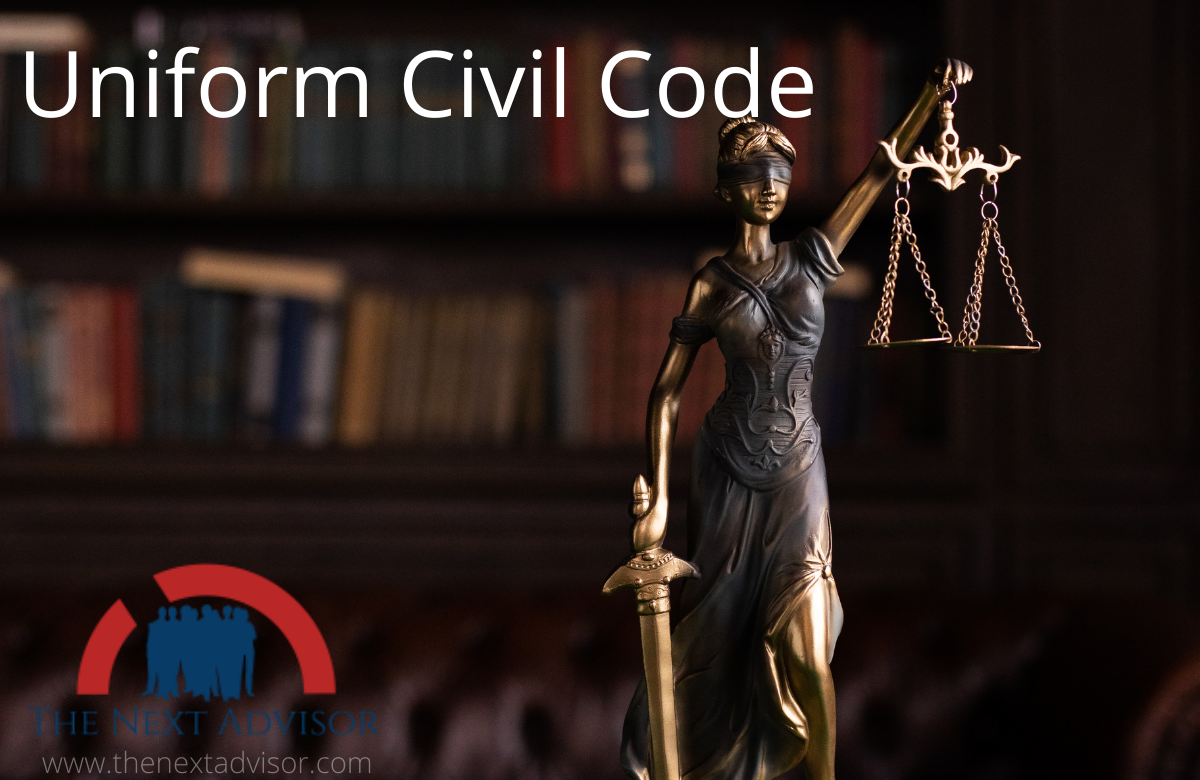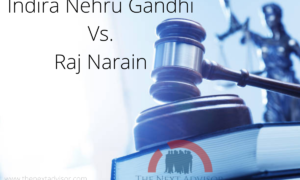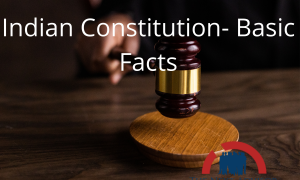You all must have listened to Uniform Civil Code. Uniform Civil Code is given in Article 44 of the Indian Constitution. And nowadays it is a big topic of debate. Let us understand, “What is Uniform Civil Code?” with some Important points.
What is the Uniform Civil Code
•A uniform civil code here refers to a single law, applicable to all citizens of India in their personal matters such as marriage, divorce, custody, adoption, and inheritance.
• It is intended to replace the system of fragmented personal laws, which currently govern interpersonal relationships and related matters within different religious communities.
History
• British government submitted its report in 1835 stressing the need for uniformity in the codification of various Indian Laws,
• But recommended Personal Laws should be kept outside codification due to vast diversity in practices
• B N Rau Committee to codify Hindu law in 1941.
• On Rau’s recommendations, the Hindu Succession Act 1956 was amended
• Codification of the law relating to intestate or unwilled succession, among Hindi Buddhists, Jains, and Sikhs.
• Muslim personal law is not codified per se and is based on their religious texts, though certain aspects of these are expressly recognized in India in acts such as the Shariat Application Act and Dissolution of Muslim Marriages Act.
• Christian marriages and divorces are governed by the Indian Christian Marriages Act and the Indian Divorce Act, while Zoroastrians are subject to the Parsi Marriage and Divorce Act.
• Then, there are more ‘ secular ‘ laws, which disregard religion altogether, such as the Special Marriage Act, under which Inter-religious marriages take place, and the Guardians and Wards Act, which establishes the rights and duties of guardians.
Constitutional Provisions
• Article 44: The State shall endeavor to secure for the citizens a uniform civil code throughout the territory of India.
• UCC is listed as one of the DPSP in the constitution;
• Therefore it can’t be enforced in a court of law. It is the prerogative of the state to introduce the Uniform Civil Code.
Why in DPSP
• The whole issue of UCC comes down to the apparent contradiction between two sets of rights
• Individual’s rights ( Right of Muslim women; against polygamy, against triple – talaq, right to inherit property )
• Collective/group rights ( Right of the religious community as a whole ie right of the community to have their cultural and religious law preserved). So essentially, UCC is about giving primacy of the individual right over group right.
Constituent Assembly Debates
• Debate regarding the Uniform Civil Code as the fundamental rights
• The matter was settled by a vote.
• By a 5 : 4 majority, the fundamental rights sub-committee headed by Sardar Vallabhbhai Patel held that the provision was outside the scope of Fundamental Rights
• Primacy was given to the freedom of religion.
Ambedkar Favoured Common Civil Code
• On December 2, 1948, Dr. B.R. Ambedkar, seen as one of the architects of the Constitution, defended the state’s endeavor to put in place a uniform civil code in the future by including it among the Directive Principles of State Policy.
• But this couldn’t be done by force, he told the Constituent Assembly, adding that it would be “ mad ” to introduce it by ” provoking Muslims. “
• This was days after he had suggested, on November 23 , 1948, that the future Parliament could — for a start – extend it to those who voluntarily agreed to be bound by it.
PROGRESS MADE FOR UNIFORM CIVIL CODE
• Mohd. Ahmed Khan v. Shah Bano 1985-To know details Please refer •Shah Bano Begum (1985) Case
• Sarla Mudgal vs Union of India ( 1995 )
• Shabnam Hashmi ( 2014 )
• Shayara Bano ( 2017 )
ARGUMENTS IN FAVOR OF UCC
• It Promotes Real Secularism
• All Indians Should be Treated Same
•It will Give More Rights to the Women
•Every Modern Nation Has it
• Personal Laws Are a Loop Hole
• It Will Help in Reducing Vote Bank Politics
• It Will Integrate India
ARGUMENTS AGAINST UCC
• Lack of political will due to the complexity and sensitivity of the issue.
• Even though it reinforces equality before the law, the idea of a UCC clashes with the right to freedom of religion (Article 25 of the Constitution)
• Separate personal laws are one of the ways in which people have exercised their right to practice their own religion, which has been particularly important for minorities.
• The UCC could become a tool to erode this right, suppress minorities, and homogenize culture.
• The Law Commission’s report on reform of family law ( 2018 ) comments that a uniform civil code ” is neither necessary nor desirable at this stage. “
• In its manifesto or Sankalp Patra released on 8 April, before the 2019 Lok Sabha elections, the BJP reiterated its stand to draft a Uniform Civil Code to deal with personal laws in India.
Goa Uniform Civil Code
Home / Elections / Chief Justice of India SA Bolde lauds Uniform Civil Code in Goa

Goa Uniform Civil Code
Chief Justice of India SA Bobde lauds Uniform Civil Code in Goa Speaking on the occasion, Justice NV Ramana, underlined the need for modernization of judicial infrastructure and called for setting up a National Judicial Infrastructure Corporation for this.
Can there be Goa’s Law as Model Law
• Goa is, at present, the only state in India with a uniform civil code.
• The Portuguese Civil Code of 1867, which continues to be implemented after India annexed the territory in 1961, applies to all Goans, irrespective of their religious or ethnic community.
Provisions of the Act
• Under the Goa civil code marriage is a contract between two persons of different sex that is man and woman with the purpose of living together and constitute a legitimate family together
• polygamy or bigamy is strictly prohibited except for certain special cases. • Monogamy is the prescribed form of marriage.
• Men cannot marry before they attain the age of 21 and the same is 18 in the case of women.
• Consent is required from both men and women before and at the time of marriage.
• Under the law of communion of assets as soon as the person gets married his spouse automatically gets half of the assets thus each having undivided rights over other assets. consent of both husband and wife to file a divorce case in the court of law and proper grounds must be presented before the court for the divorce
• There are certain restrictions due to which a certain category of persons is not allowed to marry under certain circumstances.
Issues with Act
• Not truly uniform
• There are certain provisions in the code itself that promote bigamy for Hindus in certain special cases as well as there are certain provisions that tend to discriminate against women.
• There have been certain cases in the court of law in which women are discriminated against in the name of religion and personal laws.
Hence,
• Communities should be convinced that UCC is to bring reforms not suppress them
• A top-down politico-legal solution to a social problem is always counter-productive. And hence should be used only as the last resort.



























